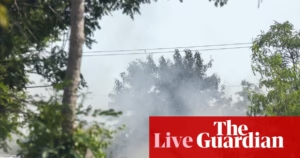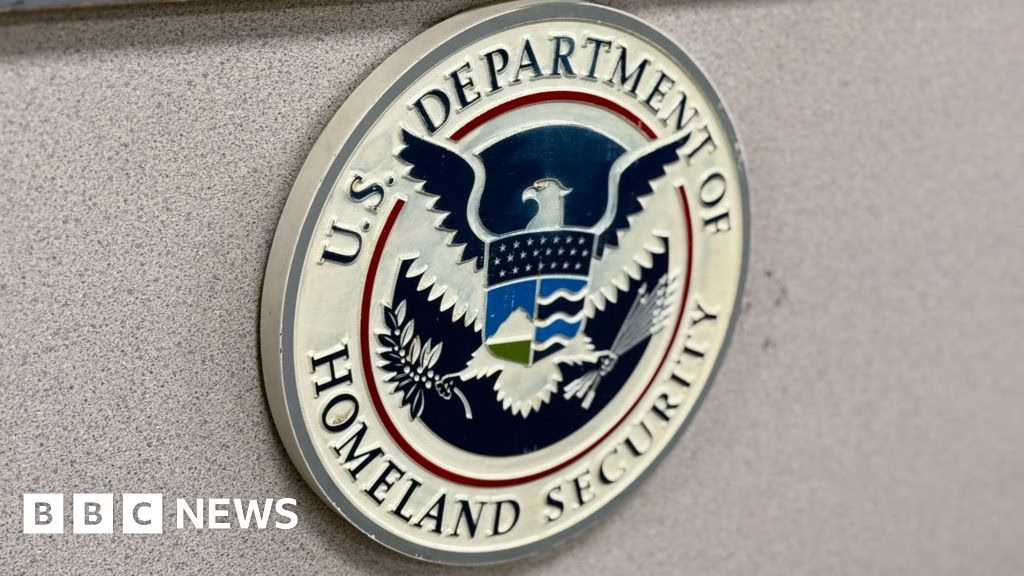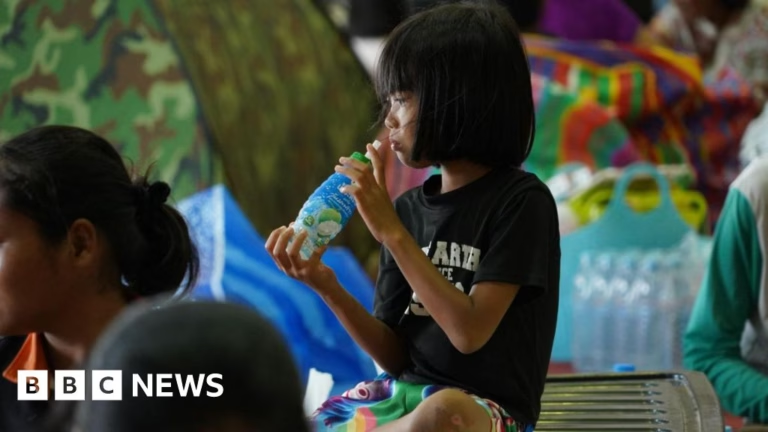BBC News, London
BBC News, Los Angeles
/6f1dfee55e88.jpg.webp)
Getty Images
Thousands of Afghans and Cameroonians will have their temporary deportation protections terminated, the US Department of Homeland Security has said.
Homeland Security Secretary Kristi Noem found the conditions in Afghanistan and Cameroon no longer merited US protections, according to a statement from DHS assistant secretary Tricia McLaughlin.
An estimated 14,600 Afghans previously eligible for temporary protected status (TPS) are now set to lose it in May, while some 7,900 Cameroonians will lose it in June.
It comes on the same day a US judge ruled that the Trump administration could deport a university graduate, detained last month over his role in pro-Palestinian protests.
TPS is granted to nationals of designated countries facing conditions, such as armed conflict or environmental disasters, which make it unsafe for them to return home.
The status typically lasts for up to 18 months, can be renewed by the incumbent Homeland Security secretary, and offers deportation protection and access to work permits.
According to McLaughlin, in September 2023 the then Homeland Security Secretary Alejandro Mayorkas announced that TPS for Afghans would be extended by 18 months until 20 May of this year.
But on 21 March, having consulted with US government agencies, Noem “determined that Afghanistan no longer continues to meet the statutory requirements for its TPS designation and so she terminated TPS for Afghanistan”, McLaughlin said.
She added that Noem’s decision was based on a United States Citizenship and Immigration Services (USCIS) review of conditions in Afghanistan, where the Taliban retook control almost four years ago.
A similar decision terminating Cameroon’s designation for TPS was made on 7 April, McLaughlin said.
Last month, Trump’s administration said it would similarly revoke the temporary legal status of more than half a million migrants from Cuba, Haiti and Nicaragua and Venezuela.
They were brought into the US under a Biden-era sponsorship process known as CHNV, which Trump suspended after taking office.
More than 120,700 Venezuelans, 110,900 Cubans and over 93,000 Nicaraguans were allowed into the US under the programme before it was closed.
Those being told to leave have been warned to do so ahead of their permits and deportation protections expiring later this month, on 24 April, according to a notice posted by the federal government.
But it is not just people granted TPS who have been affected by the US’s changing immigration rules.
Shukriah – not her real name – lives in Washington DC. She arrived in the US in January last year with her family. They had fled Afghanistan and endured a long journey to the US, across 11 countries, in a bid to claim asylum.
“The fear of deportation has deeply affected my mental and physical health. I can hardly sleep, my legs are in pain, and I cry constantly from fear and anxiety,” she told the BBC.
.jpg.webp)
Shukriah, who is seven months pregnant, received an email – seen by the BBC – on 10 April from the Department of Homeland Security which read: “It is time for you to leave the United States.”
It added: “Unless it expires sooner, your parole will terminate seven days from the date of this notice.
“If you do not depart the United States immediately you will be subject to potential law enforcement actions.”
The Department of Homeland Security website has information for Afghan nationals about how to apply for extensions to stay in the US now that programmes which previously protected Afghans are being changed.
While Shukriah’s young children would all be eligible, because of their age, her and her husband’s path might be more complicated.
“My parole was granted under the humanitarian programme, and my asylum case is still pending,” Shukriah said.
“I don’t know what steps to take now, and I am very afraid of what will happen to me and my family.”
Immigration, specifically mass deportation, was a key focus of Trump’s election campaign – and has dominated policy since he took office.
Earlier this year, data obtained by Reuters showed that in his first month back in office, the US deported 37,660 people – less than the monthly average of 57,000 removals and returns in the last full year of the Biden administration.
The Trump administration has gone on to revoke the visas of hundreds of international students in a bid to clamp down on pro-Palestinian protests at university campuses across the US.
One such case saw a US immigration court rule on Friday that Trump’s administration could deport Mahmoud Khalil, a permanent legal US resident, who has been held at a Louisiana detention centre since 8 March.
In a letter written from the facility, he has said his “arrest was a direct consequence” of speaking out for Palestinian rights.
Noem, praising the decision on social media, said “it is a privilege to be granted a visa or green card to live and study” in the US, and that “when you advocate for violence, glorify and support terrorists that relish the killing of Americans, and harass Jews, that privilege should be revoked”.
“Good riddance,” she added.
Mr Khalil’s lawyer said his team was going to fight for his client’s “right to speak out against what’s happening in the US”.








